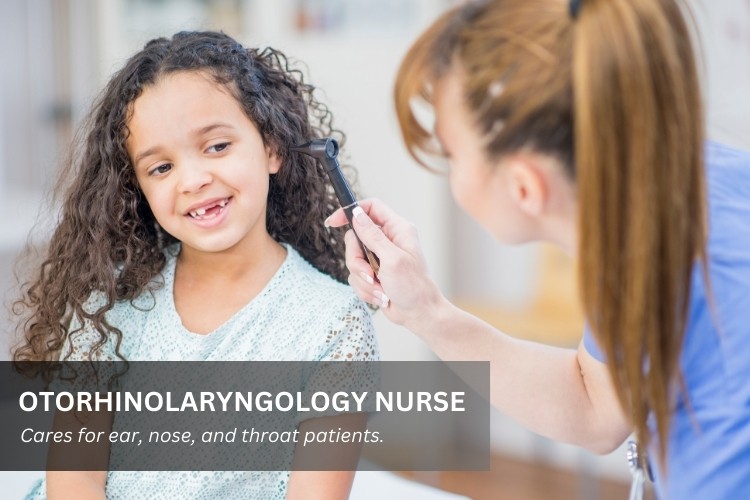Otorhinolaryngology Nurse
Healthcare Career Guide

From chronic ear infections to complex head and neck surgeries, Otorhinolaryngology Nurses care for patients with conditions affecting the ears, nose, throat, and related structures. These specialized nurses assist with diagnostic procedures, post-operative care, allergy treatments, and patient education in both clinical and surgical settings. They work alongside ENT physicians (ear, nose, and throat specialists) in hospitals, outpatient clinics, and specialty practices. Let's delve into the Otorhinolaryngology Nurse specialty and explore what it takes to thrive in this highly specialized nursing role.
Overview
What Is an Otorhinolaryngology Nurse?
An Otorhinolaryngology Nurse, also known as an ENT Nurse, specializes in caring for patients with conditions related to the ears, nose, and throat (ENT). These nurses assist with diagnosing, treating, and managing both acute and chronic ENT disorders, ranging from sinus infections and earaches to head and neck surgeries.
Otorhinolaryngology Nurses work in hospitals, surgical centers, ENT clinics, and specialty practices. They collaborate closely with otolaryngologists (ENT physicians), audiologists, and speech therapists to provide comprehensive care.
This career requires in-depth knowledge of ENT anatomy and procedures, as well as the ability to provide pre-operative and post-operative care for both adult and pediatric patients.
Education
How Do I Become an Otorhinolaryngology Nurse?
Becoming an Otorhinolaryngology Nurse requires a combination of traditional nursing education, clinical experience, certification, and specialized training related to the ears, nose, and throat. Follow these steps to enter this challenging and rewarding healthcare career:
- Earn a Nursing Degree. Complete an Associate Degree in Nursing (ADN) or Bachelor of Science in Nursing (BSN). A BSN is often preferred for roles in surgical or specialty ENT care.
- Pass the NCLEX-RN. Obtain your nursing license by passing the National Council Licensure Examination for Registered Nurses (NCLEX-RN).
- Gain Clinical Experience. Work as a Registered Nurse (RN) in otolaryngology clinics, ambulatory surgery units, or operating rooms.
- Seek Specialty Training. Attend continuing education courses or in-service training focused on ENT procedures, head and neck surgery, and airway management.
- Optional Certification. While there is no ENT-specific nursing certification, certification in perioperative nursing (CNOR) or ambulatory care nursing can enhance qualifications for ENT-focused roles.
On average, it takes 4-6 years to become an Otorhinolaryngology Nurse, including education, licensure, and specialized clinical experience. Advanced roles may require surgical nursing experience or cross-training with audiology and speech-language pathology teams.

Average Salary
How Much Does an Otorhinolaryngology Nurse Make?
Salaries for Otorhinolaryngology Nurses vary by location, setting, and level of experience. On average, an Otorhinolaryngology Nurse can expect to earn between $78,000 and $105,000 annually.
Average annual salary for an Otorhinolaryngology Nurse:
- Entry-level: $78,000 - $85,000 per year.
- Mid-career: $85,000 - $95,000 per year.
- Experienced: $95,000 - $105,000 per year.
The U.S. Department of Labor does not track salary data specifically for Otorhinolaryngology Nurses but includes them within the general RN category. The average hourly wage is approximately $42.00 per hour, translating to an annual salary of $87,360. Salaries typically range from $74,880 to $104,000 per year depending on experience and clinical setting.
Job Duties
What Does an Otorhinolaryngology Nurse Do?
Otorhinolaryngology Nurses support patients with ENT conditions, assist with outpatient and surgical procedures, and provide education and follow-up care. Their responsibilities often include both clinical and administrative tasks.
The most common job duties of an Otorhinolaryngology Nurse:
- Assisting with ENT Procedures. Support physicians during laryngoscopies, nasal endoscopies, ear tube placements, and minor surgical procedures.
- Performing Pre- and Post-operative Care. Prepare patients for ENT surgeries and monitor recovery, particularly for tonsillectomies, adenoidectomies, and sinus surgeries.
- Conducting Patient Assessments. Evaluate symptoms such as hearing loss, hoarseness, chronic sinus issues, or balance disorders.
- Administering Medications. Provide antibiotics, antihistamines, corticosteroids, and ear or nasal drops as prescribed.
- Educating Patients and Families. Teach post-surgical care, proper use of hearing aids, and symptom management for chronic ENT conditions.
- Managing Airway and Tracheostomy Care. Provide care for patients with tracheostomy tubes or complex airway needs.
- Coordinating with Audiology and Speech Teams. Refer patients for hearing tests or speech therapy evaluations as part of a multidisciplinary approach.
- Advanced Duties. Experienced Otorhinolaryngology Nurses may assist in complex head and neck oncology procedures or provide care in pediatric ENT subspecialties.
Otorhinolaryngology Nurses work in ENT offices, hospital outpatient departments, surgical centers, and pediatric or oncology units. Their role is essential in improving patient comfort, surgical outcomes, and long-term management of ENT-related conditions.

Essential Skills
What Skills Does an Otorhinolaryngology Nurse Need?
Otorhinolaryngology Nurses must possess technical skills, anatomical knowledge, and the ability to manage patients with specialized ENT care needs. These skills ensure accurate procedures and safe recovery for both adult and pediatric patients.
Here are some of the skills an Otorhinolaryngology Nurse needs to succeed:
- ENT Anatomy and Physiology. Understand the ear, nose, throat, and related head and neck structures for accurate assessments and procedures.
- Surgical Assistance. Assist physicians during outpatient ENT surgeries and ensure sterile field integrity.
- Medication Administration. Safely provide topical, systemic, and injectable treatments for ENT conditions.
- Patient Education. Teach recovery techniques, home care routines, and symptom monitoring for chronic ENT issues.
- Tracheostomy and Airway Management. Care for patients with surgical airways or obstructive breathing disorders.
- Communication Skills. Clearly explain complex conditions and procedures to patients and family members.
- Pediatric Care Knowledge. Work effectively with children experiencing frequent ENT conditions such as ear infections and tonsil enlargement.
- Multidisciplinary Collaboration. Coordinate care with speech-language pathologists, audiologists, and surgical teams.
One of the biggest challenges of being an Otorhinolaryngology Nurse is balancing precision in surgical preparation with effective communication in fast-paced outpatient settings. However, the role is highly rewarding, as it helps restore critical functions such as hearing, speech, and breathing, significantly improving patients' quality of life.
Last updated: April 18, 2025
References:
- Registered Nurses. Bureau of Labor Statistics, U.S. Department of Labor. Occupational Outlook Handbook. Retrieved April 18, 2025.
- NCLEX Nurse Licensure Exam. National Council of State Boards of Nursing (NCSBN). Retrieved April 18, 2025.
- Ent Nurse Salary in the United States. ZipRecruiter, Healthcare Career Path. Retrieved April 18, 2025.
- How To Become a Registered Nurse. Indeed, Healthcare Career Guide. Retrieved April 18, 2025.
- Otorhinolaryngology Nurse. Johnson & Johnson, Nursing Careers. Retrieved April 18, 2025.
- Society of Otorhinolaryngology and Head-Neck Nurses. Professional association for Registered Nurses (RN), Advanced Practice Registered Nurses (APRN), Licensed Practical Nurse (LPN) and RN Students. Retrieved April 18, 2025.
- Certified Perioperative Nurse (CNOR). Competency and Credentialing Institute (CCI), Learn and apply for certification. Retrieved April 18, 2025.


